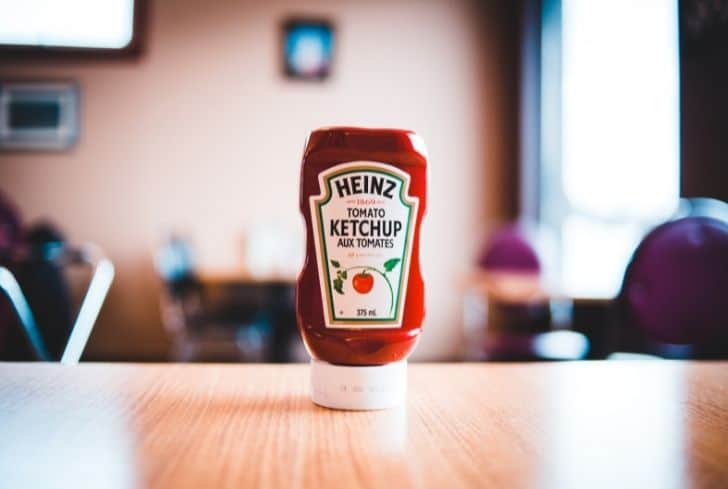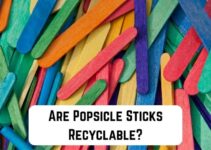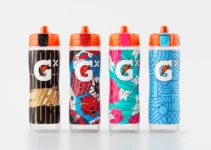Ketchup always finds its way onto our meals – it arguably goes with everything. So, it’s little wonder the average American consumes 71 pounds of the tangy goodness yearly.
Since ketchup is a manufactured food item, it mostly comes in plastic bottles and pouches. As environmentalists, we must protect the ecosystem from our untold carbon footprints. That includes disposing of our waste properly.
After squeezing out the final drops, can we put ketchup bottles in our curbside recycling bin? You will find out in this article. You’ll also catch several hacks that help you dispose of empty ketchup bottles in an environmentally safe manner. Dive right in!
Can Ketchup Bottles Be Recycled?
A recycling machine costs thousands of dollars. And if an item isn’t getting caught in its fragile components, the presence of a contaminant in a recycling batch can render the result useless.
So, recycling centers are particular about the waste they accept. Naturally, materials like plastic are acceptable by most recyclers. However, it’s also important to note that recycling policies differ from state to state – inquire before including plastic in the blue bin.
Now, can ketchup bottles be recycled? They’re plastic, so yes, you can recycle them. But most recycling facilities require you to rinse out the remnant of the ketchup before putting it in the blue bin.
What happens when you fail to recycle your ketchup bottles? Well, if you’ve been throwing your empty containers in the garbage bin, chances are they’ve been ending up in our landfills.
There are many reasons why that’s a bad ending place for plastics. One, it costs the government billions of dollars to maintain landfills. When you keep adding more non-biodegradable and biodegradable waste, they pile up, take more space, and require more maintenance.
Let’s face the environmental effects too. Plastic pollution is no joke; it’s wreaking our ecosystem. And the sooner we acknowledge that harmful components like microplastics are only everywhere because of our habits, the earlier we can repair the damage it’s doing.
Plastic never dissipates properly, even after spending long decades in landfills. They’re resistant to biodegradation factors, but toxic substances are released in the process even when it eventually occurs.
When next you consider putting your ketchup bottle in the garbage bin, think about its effects on the environment. Then, put it in the blue bin instead.
Can You Recycle Heinz Ketchup Bottles?
Heinz makes ketchup worthy of its hype. Its ingredients speak of expertise and a desire for customer satisfaction. As such, if you regularly restock this condiment, you’re among the millions of Americans that consume this product.
While burning through your fair share of Heinz Ketchup, we bet thoughts of the ecosystem cross your mind now and then. In terms of environmental safety, recycling is the best option for plastic waste.
So, can you recycle your empty Heinz bottles? Well, they’re made from PET, a type of plastic. That makes this waste suitable for the blue bin.
Thankfully, the newly improved bottles have recyclable covers. So, the average recycling facility will accept waste Heinz ketchup bottles.
If you haven’t been motivated to throw your Heinz ketchup bottles in the blue bin, chances are they go in the garbage bin instead. This can be hazardous to the environment, and you’re contributing to plastic waste.
For starters, plastic isn’t biodegradable. It’ll simply take up space in the landfills, rotting slowly and releasing harmful substances into the ecosystem. It’s also responsible for the uncontrolled release of microplastics into the environment.
Microplastics will speak of its existence when the Heinz ketchup bottle finally dissipates after several decades. Proper waste disposal is straightforward; you can either use your curbside recycling service or employ the internet in finding the closest recycling center.
Can You Recycle Plastic Ketchup Bottles?
Ketchup is made from tomatoes, vinegar, and sugar. If it’s not well preserved, these three ingredients are a recipe for disaster. Fermentation will occur, and you’ll certainly detest the oh-too-tangy taste it’ll give you.
That’s why manufacturers pay attention to the packaging for this condiment. It typically comes in plastic bottles, but some are sold in glass containers.
If you’ll be consuming a fair amount of ketchup, it’s important to consider the most environmentally friendly disposal method. If it’s a plastic bottle, you can recycle it.
Plastic is one of the most recycled materials worldwide, so its market is vast. Finding a recycling center that’ll recycle plastic ketchup bottles isn’t a hassle. If it’s not acceptable by your curbside recycling program, use the internet to find the nearest recycling facility that does. You may pay a fee if they send a representative to pick up the bottles.
Before putting it in the blue bin, it’s best to prepare the empty ketchup bottle. Chances are your recycling facility expects this from you, so they may overlook washing them before recycling.
So, ensure you rinse the bottle to remove the remnants of the ketchup. Dry it, and send it out to meet its environmentally friendly fate.
Can You Leave Labels on Plastic Bottles for Recycling?
Recycling rules vary from one municipality to another, but they exist to make the process much easier for both parties. You do your part, and recycling facilities complete the required process for reducing our carbon footprint.
In some cases, removing the label is insignificant. It’s because there’s a heating stage during the recycling process. This ensures impurities and contaminants like labels and glues melt away.
But again, some recycling facilities require you to relive the label. It’s often due to company policies.
In the same vein, removing the label may be unavoidable. For instance, if the tag is made from recyclable material, it’s only right to put it in the blue bin. If you’re donating or selling the bottles, you can also remove the label if the new user wants to use it for packaging a different material.
Essentially, there’s no harm in leaving the label on plastic bottles before recycling them. If your recycling facility is against it, you’ll receive instructions to remove it before putting the bottles in the blue bin or taking them to the recycling center.
In contrast, if there’s no direct request to remove them, they’ll not contaminate the recycling materials.
Can You Reuse Ketchup Bottles?
An empty ketchup bottle will certainly take up space in our landfills if it’s not disposed of properly. It’s made of plastic, one of the most environmentally hazardous materials that can be condemned to the ecosystem.
While plastic decomposes, its effects on the environment aren’t desirable. For one, it won’t break down for several decades, at least. And when it does, microplastics will be left behind, infesting and damaging the ecosystem.
To avoid an unfriendly effect on the environment, we must properly dispose of these bottles. Thankfully, there are many hacks you can adopt, such as the ones we’ll explore subsequently:
1. Condiment mixer
Manually mixing your condiments for a large batch of sandwiches or salad can be messy, so you should retain your ketchup bottle. The cover is easy to unscrew, so you can open it, pour your required ingredients, and give it a good shake.
You can also use the squeeze feature, guaranteed to reduce the mess that awaits you after the meal is consumed. It’s also great that ketchup plastics are easy to clean. Pour some water and dish soap into it, shake well, and rinse.
2. Store ketchup
You can reuse your ketchup bottle to store ketchup. Bulk purchases are better, so it’s scarcely shocking when most people buy the largest size of a product.
If you’re guilty of this, you can use your old let hop bottle to store smaller amounts of the new batch. It’s better to control your consumption of this condiment and ensure it’s well preserved. You don’t want that new batch fermenting and going sour.
3. A watering bottle
What makes a ketchup bottle even more fun to use? It’s the feature that allows you to squeeze out the quantity you need. Well, you can take advantage of it by turning the old container into a watering bottle.
If you fancy yourself a green thumb, you probably have a few indoor plants that require special attention. Instead of spending money on new supplies, upcycle your old items by improvising and using them in another aspect of home keeping.
What Can You Do With Old Ketchup Bottles?
Although an empty ketchup bottle is probably the last item you’re thinking of holding onto, take that step. There are many hacks you can apply to upcycle empty ketchup containers. So, even if recycling isn’t readily available, you can cut back on your carbon footprints.
Your options include:
1. Storage
Almost anything can serve as secure storage for household items. It’s an excellent storage container for materials like beads, glitter, and other smaller things commonly used for arts and crafts.
2. Pancake Dispenser
Getting the right amount of pancake mix can be a hassle, especially for newbie chefs. If you’re tired of pouring too much batter into your pan, you can transfer it into an empty ketchup bottle instead.
The small hole at the top will make it easier for you to control the amount of batter. Again, ketchup bottles are easy to clean, so you can wash this container and use it countless times.
3. Pool toy
Using empty ketchup bottles as pool toys is another environmentally friendly way to dispose of this plastic waste. This hack is commendable for many reasons, starting with your reduced consumption of plastic or pool-suitable toys.
It’s a win-win solution because you save money on toys, consume less products, and reduce your carbon footprints.
The empty ketchup bottle is an excellent toy pool gun replacement – full it with water and enjoy!
4. A paint holder
A paint holder is another awesome way to upcycle empty ketchup bottles. If you have children, chances are you’ll need to repaint some sections of your walls almost frequently. Well, instead of toting heavy and noisy cans of paint around, the empty ketchup bottle is a handy container for it.
You only need to open the bottle, dip your brush inside, and get to work.
5. Homemade condiments
Plastic condiment containers are arguably the cutest items on the market. However, we increase our plastic consumption the more we purchase these items. And while recycling this material is possible, it doesn’t totally solve the challenge of an increasing carbon footprint.
So, instead of investing in new plastic containers, save up your empty ketchup bottles. Then, fill them with your marinara source, salad dressing, or condiments that appeal to you.
6. Lotion container
If you’re more of a DIYer, you can use empty ketchup bottles as containers for homemade lotions and liquid soaps.
Conclusion
Trust us; plastic leaves unimaginable damage to the environment. That’s why it’s vital to explore eco-friendly methods of disposing of it.






